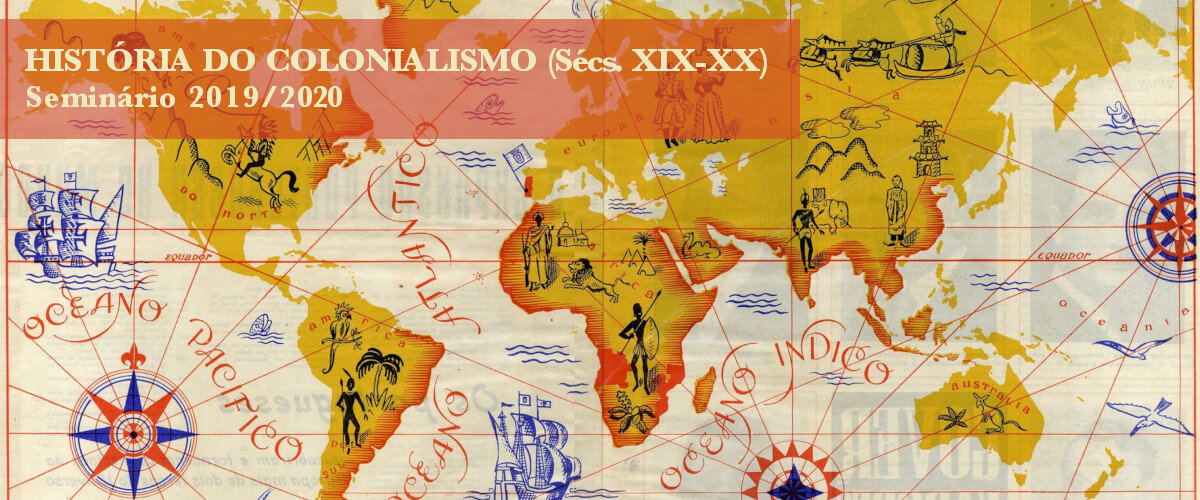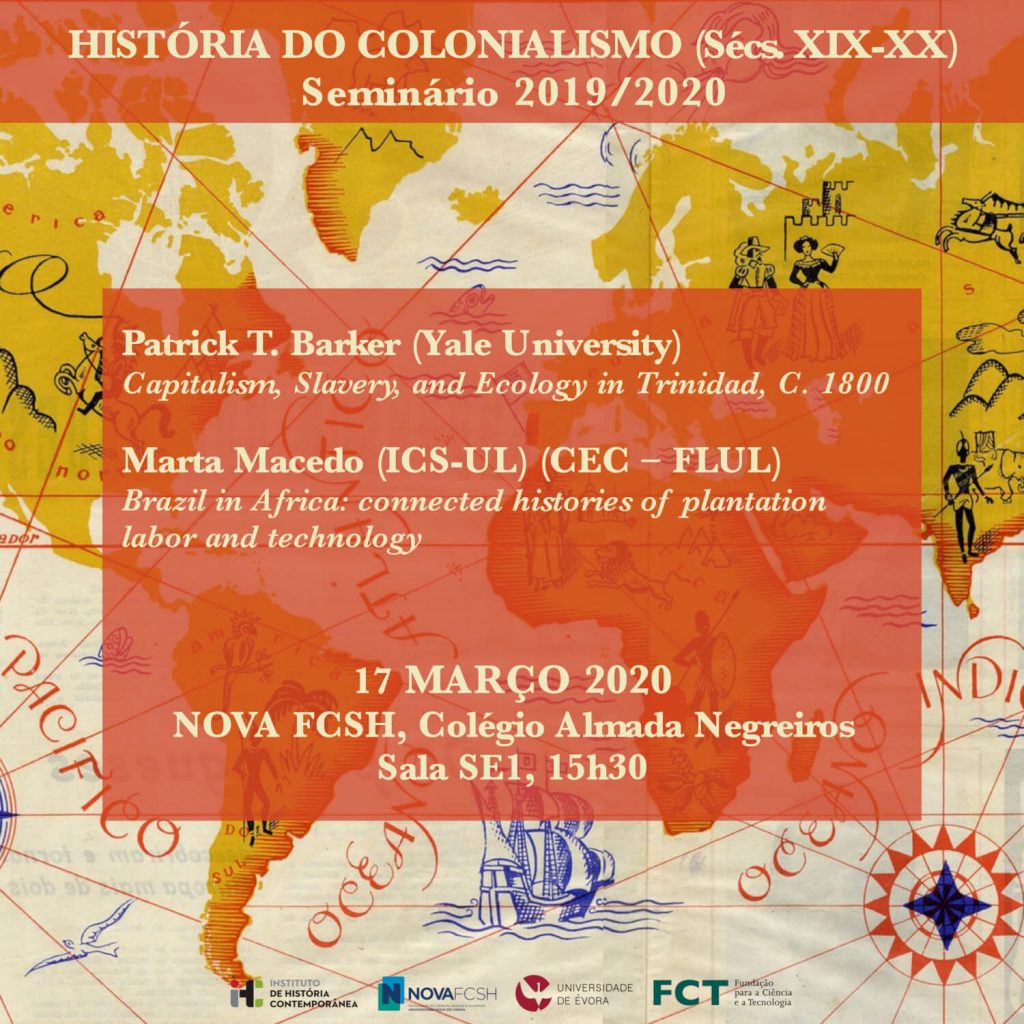março, 2020

Detalhes do Evento
[CANCELADA] Quarta sessão do Seminário de Investigação em História do Colonialismo (Sécs. XIX-XX), dedicado à investigação do passado colonial e dos seus legados históricos, promovido no âmbito da
Ver mais
Detalhes do Evento
[CANCELADA] Quarta sessão do Seminário de Investigação em História do Colonialismo (Sécs. XIX-XX), dedicado à investigação do passado colonial e dos seus legados históricos, promovido no âmbito da Linha Temática “Colonialismo, Anti-Colonialismo e Pós-Colonialismo: Repensar Impérios e as suas Consequências” do IHC.
O Seminário de Investigação em História do Colonialismo (sécs. XIX-XX) pretende constituir-se como um espaço de discussão informal e aberto em que investigadores/as possam apresentar e debater as suas pesquisas (em curso ou já concluídas) sobre qualquer aspecto da história do colonialismo, descolonização e sociedades pós-coloniais nos séculos XIX e XX.
A primeira edição decorrerá entre Janeiro e Junho de 2020.
Cada sessão será constituída por uma apresentação (20 a 30 minutos) ou duas apresentações complementares (máx. 40 minutos no conjunto), seguindo-se uma troca de ideias sobre a temática abordada.
Programa da 4ª Sessão:
Patrick T. Barker (Yale University): Capitalism, Slavery, and Ecology in Trinidad, C. 1800
The rise and expansion of slave-based plantation agriculture in the greater Caribbean was an ecologically degrading project at its core. Slaveholding planters in the greater Caribbean spent much of their lives attempting to naturalize the exploitation they wrought upon enslaved people, the forests they destroyed to plant sugar and other commodities, and the soil they degraded beneath their feet. Over centuries of state-backed exploitation in the region, generations of planters harnessed extreme racialized ideologies, mapped sovereign indigenous space as unoccupied and unused, and re-imagined commodities produced by slave labor on an industrial scale as the “natural products” of the Caribbean islands. The deep imperial commitment to retaining the Caribbean as an unfree sugar-producing space in post- emancipation period took centuries of ideological work, fiction-making, and extreme violence to realize. It too, had long demanded the degradation of an entire region’s ecology as a naturalized outcome of so-called economic success for imperial powers and their capitalist agents on the ground.
This paper explores the relationship between capitalism, slavery, and ecological degradation during the early nineteenth century in the Caribbean island of Trinidad. Once annexed by the British in 1797, planters, engineers and merchants rapidly deployed the newest fossil-fuel technologies on Trinidad to process sugar at faster rates as they sought to replace the former French colony of Saint-Domingue, then in the midst of what would become the Haitian Revolution. Bodies were broken and forests were flattened to support the island’s new sugar-slavery nexus. As slave-traders hurried to supply the newly annexed colony with enslaved laborers, planters drew on steam technologies that made worse field-working conditions across the colony’s nascent plantations. Those same steam-based technologies necessitated fuel thieved from flattened forests, whose gruelling deforestation decimated enslaved communities and exposed already-precarious maroon encampments. The paper considers how these developments were linked to broader patterns of global environmental transformation at the turn of the nineteenth century, emphasizing in particular the material relationship between racial slavery and the origins of fossil-fuel capitalism. Drawing on the work of Eric Williams and sociologist Jason Moore among others, this paper argues that Trinidad circa 1800 represents among the rawest expressions of the racialized capitalocene in full and violent swing. The paper demonstrates that the very same steam technologies deployed in Trinidad were themselves originally funded by Jamaican slave-traders’ capital which had flowed back to Britain’s merchant houses across the long eighteenth century. In exploring these interrelated exploitations of racialized labor, the application of fossil-fuel based steam technologies to produce sugar, and the island’s ongoing environmental degradation, the paper calls into question the validity of anthropogenic explanations for long-run environmental transformation at the turn of the nineteenth century. Instead, the paper emphasizes the material links between racialized exploitation, the plantation, the material wealth of the slave trade, and the fossil-fuelled industrial order of nineteenth century Europe.
Marta Macedo (ICS — ULisboa): Brazil in Africa: connected histories of plantation labor and technology
Plantations as violent systems of land appropriation, of labor recruitment, control and extraction, aimed at the intensive cultivation of single crops for export, have spread across the African continent, from the 1850s onwards. Regardless the use of the plantations as an empirical object and category of analysis for theorizing relations of labor and race (from slavery to indentureship), environmental degradation and capital, scholars have very often taken the plantation institution for granted, paying little attention to its problematic nature as defined through concrete technologies and to the specific networks though which these technologies circulated. This paper will thus explore the experimental practices aimed at producing coffee for the market and at producing particular racialized populations as they moved across the Atlantic.
In the early 1850s, when Angolan slave trade to Brazil was finally abolished, former slave traders, operating in both sides of the Atlantic, invested their profits in new plantations in the a small island in the West Coast of Africa (São Tomé), importing thousands of Angolan workers and adapting several technologies of land and labor management from the burgeoning Brazilian coffee plantations of the Paraíba Valley. Despite the obvious connections between Africa and Brazil, this is still an unexplored history. This paper, firmly grounded on the methods and current historiographical and theoretical debates of historians of technology attentive to circulations and connections, aims at bringing together these disparate geographical and historical contexts. By following native São Tomean slave traders turned into planters, and what moved along with them, namely Brazilian agronomic knowledge, I want to discuss the technological work required for the plantations to cross national and imperial boundaries. Merging the histories of technology with broader histories of colonialism and labor, it is also possible to appreciate how practices of race making, be it the material and symbolic processes by which “Angolans” were transformed into “blacks” suited to grow coffee, were also crucial dimensions of this transatlantic plantation world.
Tempo
(Terça-feira) 3:30 pm - 5:00 pm
Localização
NOVA FCSH, Colégio Almada Negreiros, Sala SE1
Campus de Campolide da NOVA — 1099-085 Lisboa
Organizador
Instituto de História Contemporânea — Faculdade de Ciências Sociais e Humanas da Universidade NOVA de Lisboacomunicacao.ihc@fcsh.unl.pt Avenida de Berna, 26C — 1069-061 Lisboa

